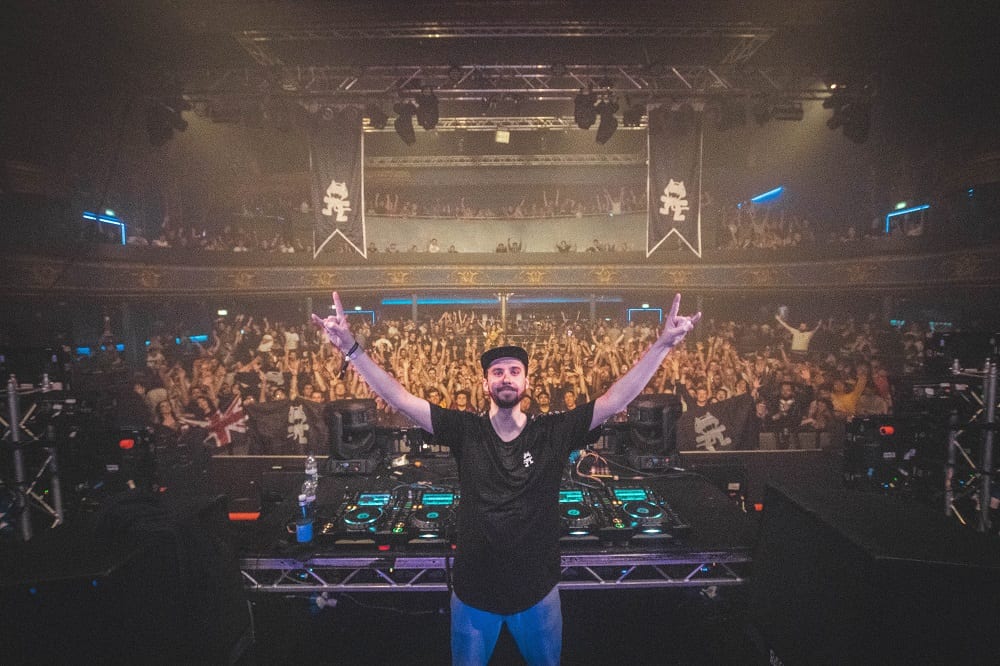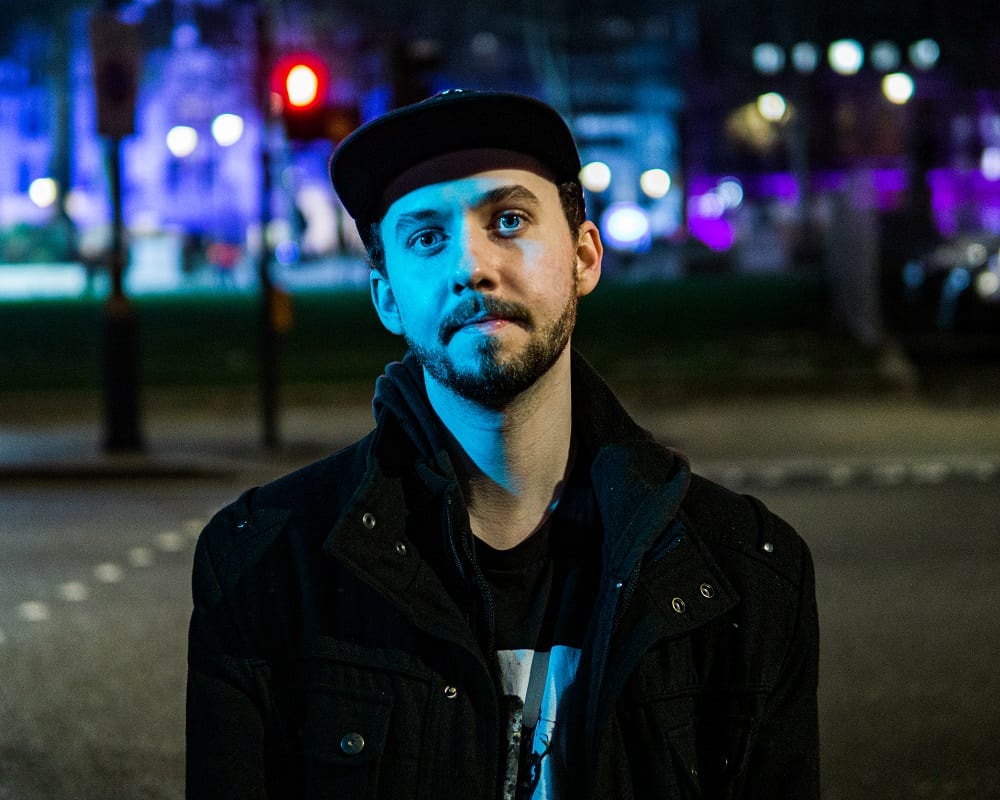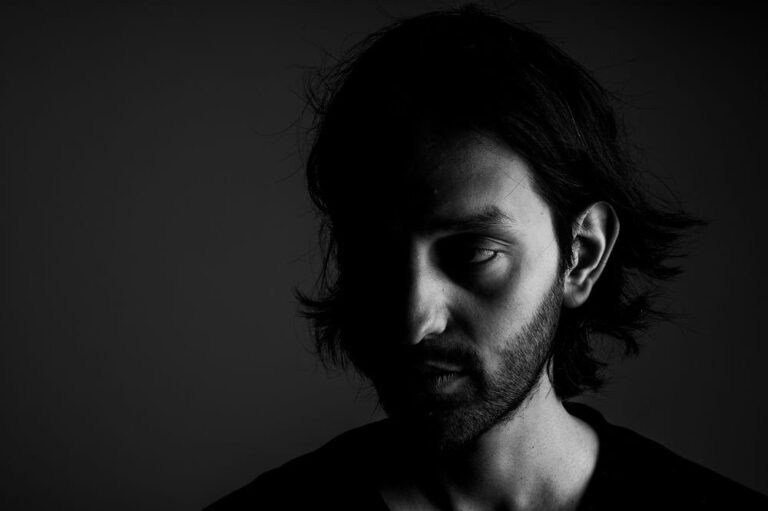Images: @Protostar/@lasyen_ & @Klasvisuals
His profile dates back almost a decade. His style is rooted in rock, but takes in dubstep, glitch-hop and all things in between… And now he’s heading in a new direction.
Joining the diverse Monstercat line-up. Protostar made a grand entrance on the label in 2013, hitting the #1 Beatport dubstep single with MakO on ‘No Fire’. He then topped the charts once again in 2015, this time with the glitch-hop banger Genesis. More recently he’s on new mission: his sound evolving into drum & bass. Notably through his collab with MUZZ: a bass-heavy dancefloor shredder, called Meltdown (released in 2018) or the futuristic and anthemic Isolation, a collab with Hayve in 2019.
Now come Protostar’s latest weapons: New Horizons and last month’s release, titled Galaxies. While they haven’t topped charts yet, they certainly made an impact. Both got featured in the popular eSports-game called Rocket League, amassing almost two million plays combined on Spotify.
Meanwhile, despite the lack of dancefloor vibes, this young UK producer, finds new ways to connect with his fans by involving them in his writing… How exactly? Read on and find out – also about how he fell in love with electronic music, plus Protostar’s focus for rest of 2020 and beyond!
How are things?
I’m good! Trying to keep busy with production and staying on top of my schedule.
The current situation isn’t ordinary due to COVID-19. How has this been working out for you creatively?
Honestly it hasn’t affected me too much in regards to my creative process, because it’s quite similar. I’ve been improving in terms of creative flow, I found the flow that I like and been working on that a lot. The only thing it affects are my live shows.
How about the void to fill due to the absence of shows?
I’ve only recently started switching over to drum & bass. I have been trying to break into that scene, because I used to do more glitch-hop. This year I started to get more bookings, which obviously have been cancelled and moved to 2021, so in that respect: yeah. Most of my time is spent on trying to produce and keeping the flow going with one track a month.
Can you tell us more about your decision to transition from glitch-hop to drum & bass?
I’ve always been into drum & bass. My first experience with it, like for a lot of people, would’ve been Pendulum, because they’re quite rocky and my background in music is in rock, so it was an easy transition while getting into electronic music.
Glitch-hop, while I loved the genre, felt like it wasn’t really going anywhere in terms of bookings of hearing it being played at clubs anymore. So it was extremely hard to keep growing and keep pushing. The next option in terms of viability to keep at it, was to go to the next big genre that I loved, which was D&B.
I feel like a lot of glitch-hop artists have gone to do half time and stuff, which is really cool, because it’s a similar vibe, but around 170 bpm, instead of a 100. It makes it easier for people to play at shows, because you can play it at D&B shows more easily, due to the tempo.
Did hitting the number one spot with Genesis on Beatport also feel like it’s time for a new challenge perhaps?
Haha, I almost forgot about that. I mean, doing glitch-hop was good fun and I will always have a love for it. Recently, I did a set on the Monstercat Twitch and started off with a bunch of glitch-hop. When I play live, I usually have a section where I play some classics, like tunes from Koan Sound, and some of my own stuff. There’s still stuff I love and I will probably do more (with it) in the future.
In technical terms, how did this transition go about, regarding your approach to writing drum & bass when compared to glitch-hop?
The main thing I noticed, at glitch-hop level in terms of bpm and how the drums work; you have a lot more space in between the drums to do unusual rhythms. In drum ‘n bass everything is a lot tighter, so you got to be more deliberate with what you place between the drums, as well as rhythm-wise.
Otherwise, pretty much all of the skills transfer, because glitch-hop has a similar drum style; very short drums. The other things, adaption-wise, are tied to style; seeing what’s done in the scene at the time. After doing glitch-hop for a while, you get used to doing that a certain way.

You talked about coming from rock. Can you tell us more about your experience before Protostar?
I started back in school, I took music technology A-level, which is the couple of years before university. Before that, I was just playing and learning guitar – playing rock – and recording some things at music class at school – basically practising riffs, but nothing proper. When I went into music-tech, I found dubstep.
The first thing I heard, actually on UKF, was Blue Foundation Eyes On Fire (Zeds Dead Remix). I remember when my friend showed it to me and it was mind blowing. And then I heard a bunch of Flux Pavilion tunes, those really spoke to me, because Flux was doing a sound that I haven’t heard before, like all these kind of straight basses that were chords. The writing of the songs really felt rocky and very easy for me to listen to as an outsider.
That really inspired me to write dubstep. At some point my friend showed me Koan Sound, and I was like: ‘wow, what is this?’ I ended up loving glitch-hop and started diving into that.
A couple of your tunes have been featured in the popular Rocket League game, more recently Galaxies, which racked up 400k+ plays already on Spotify. Can you tell us how this collaboration came about?
Monstercat has been working with Rocket League for a good while now, they have been releasing these compilation albums on Rocket League. I knew my boss Jon (Going Quantum) was looking for music, so I sent him a bunch of tracks – this was back in something like 2017 – and he liked one of them, but he wanted me to work a bit on them and make them more accessible for the Rocket League crowd.
It was quite a shuffley tune, so I fixed that up a bit and made it more straightforward drum ‘n bass. Then Rocket League ended up liking it and signed it. The second one, Galaxies, I was making a more anthemic dancefloor track, where you can hear the crowd singing back, like at a live show. That was the idea behind it.
Because these voice samples were actually recorded for Galaxies?
Yeah, for that I crowdsourced pretty much all the vocal samples. I sung myself and had plugins for the choirs. Then I made a riff and put it on Twitter, saying: if you want to be a part of this song, submit your recording of you singing and I will add it in. I had to edit in like 80+ vocals into the track. It took a while, but it was good fun. It sounds quite cool. I sent it over to Monstercat and it wasn’t actually written for Rocket League. Then I thought: maybe they can send it in to Rocket League, so Monstercat sent it over, and they loved it.
The streams so far have been insane. Hundreds of thousands plays, while it barely has been two months since the tune is out. That’s quite big for someone of my size. I’ve also seen a good influx of new fans coming over from Rocket League and commenting they love the track in the game and saying really nice things. It’s been a real cool experience.
Not only because having a track in Rocket League, before I had a song in Rocket League, but it was part of a compilation and wasn’t a launch track when the game booted. This time having my song being played whenever people open the game, for an entire month – that’s something really really cool!
Monstercat isn’t known as a strictly drum & bass label in the first place. So while the reach is very huge, it’s less focused on this specific niche. How do you practically go about this?
Monstercat has been releasing drum & bass for a long time, but it isn’t their primary focus as they release so many other genres also. It’s a benefit to expose your music to such a wide audience still. For example, my main audience is in the US, so I get to expose people that might not have listened to drum ‘n bass before. The downside is that people in drum ‘n bass don’t really look at Monstercat as a source for it. It can be quite hard to get your name out there, unless you are really kind of pushing it out in front of their faces.
When people release on big D&B labels, there’s a culture built up around those type of imprints, where people will come to expect a certain standard or style. I’m trying to help put Monstercat on the D&B map alongside a handful other artists there by getting our music out into the scene and be like: ‘hey, Monstercat releases some cool & unique drum & bass, so give us a listen and give it a shot!’
What are you the most excited about right now in regards to Protostar for the upcoming months?
This year I had the plan to do one track a month. I started off in December and have had one track out every month. I’m planning to hopefully see that through until the end of the year. Yeah, the focus is pretty much on drum ‘n bass. There are no release details I can share unfortunately, but I’m excited to keep pushing this year and keep getting music out. And then next year maybe another EP. I did one called SEQUENCE, a seamless back-to-back drum & bass EP with some half time on it as well.
Would you like to talk about your goals for the upcoming years? Anything specific that you would like to achieve that you can share? An album perhaps?
Ah well… an album is a hard one, because I know how much work and prep would go into it. It would take me a good part of a year to do an album that I’m happy with, so I would have to be in a very good place to be able to do one. A tour in the US would be a good bucket list thing.
Nice. Any final thoughts?
I want to say thanks to the people who have stuck with me during my transition into drum & bass and have given it a chance. It has been really cool to see. And also my mentors, like MUZZ, who has been a huge help. And friends like Jordin Post. There are actually a lot of people to mention… My girlfriend Phia who has been really supportive as well, and my core group of friends I talk to on a daily basis, shout out protopia crew (laughs). It’s been a journey and I’m looking forward how this year and the next will pan out.


